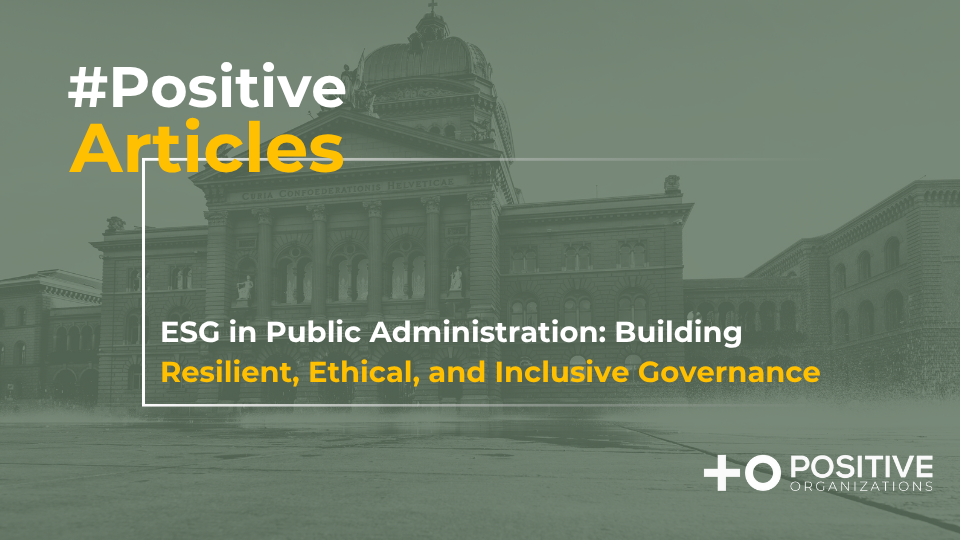News & Publications
.png)

Allignment of the Swiss sustainability reporting policies with International standards
On June 26, 2024, the Swiss Federal Council began a consultation process to amend the Swiss Code of Obligations.
The amendment aims to tighten transparency rules for corporate sustainability reporting, aligning the already existing Swiss regulations on Corporate Responsability with the European Union standards, which means more companies will have to report on the risks of their activities in relation to the environment, human rights and anti-corruption as well as the measures taken to address them.
Under the proposed change, companies that must report are identified based on criteria such as balance sheet total, turnover, and workforce size. If the old corporate social resposanibility directives used to only affect big companies, social corporate responsability reporting has now become a reality for most small and medium enterprises.
But what companies?
With the new changes from the Federal Council, the scope of companies required to publish sustainability reports greatly increases. All companies falling under the following criteria:
- Public Interest Companies
- Companies fulfilling two of the three followin criteria for two consecutive fiscal years
- Average annual full-time workforce of 250 employees
- Balanche sheet total of CHF25 million
- A turnover of CHF50 million
- Companies obligated to prepare consolidated accounts under Article 963 and exceeding the above thresholds collectively
Exemptions apply for companies controlled by an entity that publishes an equivalent foreign sustainability report and for very small companies.
Before the amendment, companies with a workforce of over 500 employees, a total of 20 million CHF balance sheet and a turnover of 40 million CHF were affected by the corporate social responsability directives.
With the new changes, it is estimated that the number of companies required to publish a sustainability report will increase from approximately 300 to 3500.
After the consultation period closes on October 17th, 2024 (period of time in which Stakeholders can provide their input on the amendement), and after a two-year transition period, all companies that fall under the new criteria must compile a sustainability report, covering strategy and governance, risk management, and metrics and targets, in line with European standards. Companies can choose between European Sustainability Reporting Standards (ESRS) or equivalent standards which the Federal Council will define in a later relevant ordinance. Furthermore, the proposed revision requires external assurance by an independent third party to assure the report’s credibility and reliability.The report needs to be published in electronic format following the European Single Electronic Format (ESEF). Finally, the report needs to be approved by the Annual General Meeting by a binding vote.
What are the consequences and opportunities of these changes?
A broader range of companies, including smaller and medium-sized enterprises, will be required to disclose detailed sustainability information. Companies will be held to higher standards of corporate responsibility and sustainable practices.
Until October 17th, 2024, the consultation process allows stakeholders to influence the final shape of the regulations, granting active participation to those interested in it. The new regulations on sustainable business management will generate costs for businesses. The Executive is currently examining existing possibilities at the federal level to support Swiss companies in introducing the new regulations (Po. 23.4062).
The amendment will lead to increased transparency in corporate sustainability reporting. After implementation, Swiss companies will align more closely with international norms, particularly the EU standards. As per their nature, many Swiss companies on different markets have their biggest commercial partners in Europe, and adapting to European and International standards of reporting obligation allows continued trade with already existing commercial parties and at the same time enhances the company’s reputation, strenghtening trust among suppliers and investors.
Swiss companies will therefore operate under the same rigorous standards as their European counterparts, maintaining competitive equality on their markets.
The mandatory inclusion of sustainability aspects, such as environmental, social, and governance issues, will promote a stronger focus on sustainable business practices within companies.
External assurance and detailed reporting requirements will enhance the credibility and accountability of sustainability reports and therefore of the company, while the requirement to publish reports electronically in a standardized format will make the information more accessible and comparable, furthering the company’s credibility.
The new amendment should not be seen as a burden but as an opportunity for more companies to further embrace the ever-changing business environment and adapt for better sustainability accountability.
Start Your
Journey Today









.png)





